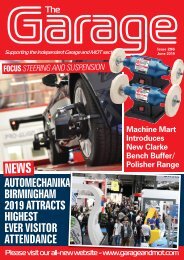You also want an ePaper? Increase the reach of your titles
YUMPU automatically turns print PDFs into web optimized ePapers that Google loves.
FLEX FUEL HAS<br />
THE ANSWER<br />
JUST SHY of 40m cars<br />
on Britain’s roads<br />
now face stricter MOT<br />
testing as a result of<br />
the new changes introduced<br />
by the DVSA earlier<br />
this year. New diesel emission<br />
checks will be required<br />
to make sure vehicles meet<br />
“plate standards”. If they fail,<br />
the repair bill could run into<br />
thousands of pounds, which<br />
for some vehicles will be more<br />
than the car is worth.<br />
Most at risk are drivers of<br />
any diesel car from around<br />
2006 onwards – models that<br />
came with a diesel particulate<br />
filter (DPF) to clean up<br />
its emissions. <strong>The</strong> cost of reinstating<br />
a DPF (some drivers<br />
and not so environmentally<br />
conscious garages removed<br />
DPFs altogether for performance<br />
gains and because of<br />
the expense of replacing) or<br />
replacing a broken one can<br />
often be more than the car’s<br />
residual value.<br />
When the DVSA set the<br />
deadline of 20th May 2018 for<br />
all MOT stations to upgrade<br />
their emissions analysers to<br />
meet the new EURO 6 emissions<br />
standard, it created a<br />
degree of panic on two fronts:<br />
for drivers, the prospect of<br />
expensive bills and for MOT<br />
stations, are a genuine concern<br />
as demand for new emission<br />
analysers across Europe<br />
is outstripping supply. But it<br />
is not just a ‘hardware’ issue -<br />
many testing stations are waiting<br />
for calibration upgrades to<br />
their existing analysers. And<br />
calibration is not a one off,<br />
it needs repeating every six<br />
months.<br />
Whilst a work around has<br />
been agreed with the DVSA<br />
- meaning MOT stations can<br />
continue to carry out tests on<br />
existing equipment so long<br />
as they can prove they have<br />
placed an order for replacement<br />
equipment before the<br />
deadline of September 2018!<br />
<strong>Garage</strong>s are duly concerned<br />
about being compliant by law<br />
and so now it’s imperative<br />
that aftermarket solutions are<br />
made available to them to ensure<br />
MOT stations can meet<br />
the obligations being imposed<br />
upon them - for their own legality<br />
but also out of service to<br />
their customers.<br />
Whether the September<br />
deadline will be met and garages<br />
will be equipped to<br />
measure the new emission<br />
standards remains to be seen;<br />
but, gas analysis aside what<br />
choices do garage owners and<br />
consumers have to ensure vehicles<br />
meet the new emission<br />
standards?<br />
What are those choices?<br />
It is agreed by most in the<br />
industry that carbon deposits<br />
are responsible for multiple<br />
engine problems; decreased<br />
engine performance; increased<br />
fuel consumption and<br />
MoT emission test failures.<br />
1 - Chemical clean: <strong>The</strong>re<br />
is a plethora of chemical<br />
cleaning products available<br />
to consumers and garage<br />
owners, but they are<br />
not without their own<br />
environmental impact.<br />
2 - Replace the parts, or<br />
replace the car! Given most<br />
cars affected by these new<br />
changes will be from around<br />
2006 onwards - the cost<br />
of labour and replacement<br />
parts might well outweigh the<br />
residual value of the vehicle.<br />
3- Hydrogen cleaning has<br />
become an increasingly<br />
attractive option for many<br />
reasons. <strong>The</strong>re are a range<br />
of hydrogen cleaning<br />
manufacturers - most<br />
emanating from the far east;<br />
others converting welding<br />
machines to perform a<br />
similar function. <strong>The</strong> former<br />
suffer from low quality build<br />
materials, and the rigidity,<br />
integrity and longevity<br />
required for a garage<br />
environment. <strong>The</strong> latter, is<br />
not specifically designed<br />
for the job meaning the<br />
volume of hydrogen<br />
produced is limited<br />
and total run time is<br />
in the tens of hours -<br />
again not ideal for the<br />
demands of the UK<br />
MOT sector.<br />
This year, the UK welcomed<br />
a new entrant<br />
to the hydrogen engine<br />
cleaning industry, FlexFuel<br />
Energy Development<br />
(FFED). Today, its distribution<br />
network includes<br />
more than 800 centers<br />
in France, Belgium and the<br />
United Kingdom.<br />
FFED uses its HY-Carbon<br />
solution - a hydrogen decarbonizing<br />
process - to reduce<br />
engine emissions and fuel<br />
consumption and increase engine<br />
performance. By injecting<br />
hydrogen into the intake<br />
manifold, carbon deposits are<br />
eliminated from key engine<br />
components responsible for<br />
performance and emissions -<br />
the admission valves, the EGR<br />
valve, the turbo and the particle<br />
filter.<br />
An engine treated with HY-<br />
Carbon technology reduces<br />
Co2 and CO emissions by up<br />
to 50%; and significantly reduces<br />
NoX emissions by up<br />
to 54%.<br />
Availability<br />
FlexFuel Units are available<br />
now. <strong>The</strong> lease cost of the unit<br />
is £299 per month and garages<br />
only need to treat two<br />
vehicles per month to cover<br />
the cost of the lease - anything<br />
thereafter is profit.<br />
No consumables, no maintenance,<br />
no labour makes<br />
HY-Carbon one of the most<br />
profitable machines in the<br />
workshop with units available<br />
within 15 days of order.<br />
31 Fuel Flex Advertorial.indd 1 04/02/2019 09:33

















